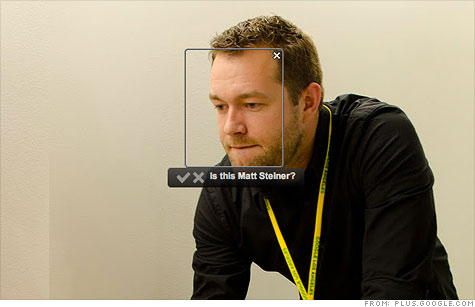
Google's new Find My Face technology will suggest nametags for photos' subjects in Google+.
WASHINGTON (CNNMoney) -- Google made its first foray into the growing field of social facial recognition technologies on Thursday, introducing Find My Face, a tagging suggestion tool for its Google+ social network.
On the surface, it operates pretty much identically to Facebook's facial recognition technology, Photo Tag Suggest. Find My Face scans users' and their friends' photos for recognizable faces, and suggests nametags for the faces by matching them with users' profile photos and other tagged photos on the social network.
But Google's Find My Face technology has been built with some key differences that the search giant believes will help better ensure users' privacy.
For instance, unlike Facebook, Google (GOOG, Fortune 500) prompts users to opt into the service before it starts automatically suggesting to their friends that they be tagged in photos. Only after a Google+ user opts into Find My Face will Google construct a face model of that person, using his or her profile photo and existing manually tagged photos on the site.
Google also requires the subject of a suggested tag to approve it before it goes public if the tagger isn't in the tagee's "circles." Facebook allows all tags to go live before notifying the subject.
"Privacy has been baked right into this feature," said Benjamin Petrosky, product counsel for Google+, at a facial recognition policy summit held by the Federal Trade Commission in Washington on Thursday.
Facebook suffered a heap of criticism from regulators across the globe after quietly turning on its facial recognition feature and opting in hundreds of millions of its users a year ago. The company apologized and developed a way for users to opt out of the suggestion feature.
The social network also took some heat for forcing users to adjust their privacy settings to opt out if they don't wish their faces to be used for tag suggestions.
On Thursday, Facebook received even more criticism by some privacy advocates at the FTC conference for not requiring pre-approval for tags.
Erin Egan, Facebook's chief privacy policy officer, said the company does enough to ensure its members' privacy by notifying them when they've been tagged and allowing them to remove tags once they've been made.
But privacy advocates say that's too late, since users can only remove tags once they've already gone public. Users can adjust their privacy settings to pre-approve tags before they are linked to their profile, but they still can't pre-approve tags before they are issued at all. For those users, the only way to avoid the situation is to adjust their privacy settings to completely disable the ability for others to tag them.
It wasn't just Facebook taking some heat. Though conference attendees generally applauded Google's efforts to ensure privacy, they also saved some criticism for Find My Face.
Unlike Facebook, which requires friends to mutually agree to befriend one another, Google+ members can place one another in circles without being "encircled" back.
That makes it more difficult for Google to know who to suggest tags to, leaving open the possibility that people you don't want tagging you will be getting automatic tagging suggestions for your face from Google.
"The goal is to only suggest tags for people that you know or we think you know," said Google's Petrosky. "It doesn't have to be bi-directional."
Petrosky said Google's algorithm works so that if all the sharing on its social network is coming from one user and not the other, that will tip off Google that those users don't have a real connection, even though one may follow the other. Plus, tags still have to receive approval if the person issuing the tag isn't in the subject's circles.
Tagging may be the digital equivalent of writing names on the back of a photograph, but in a world where people can automatically be recognized in photos by computers, it raises a host of privacy concerns that don't have clear or obvious solutions.
Both companies are treading lightly. Facebook and Google have each settled lawsuits with the FTC for violating users' privacy. ![]()